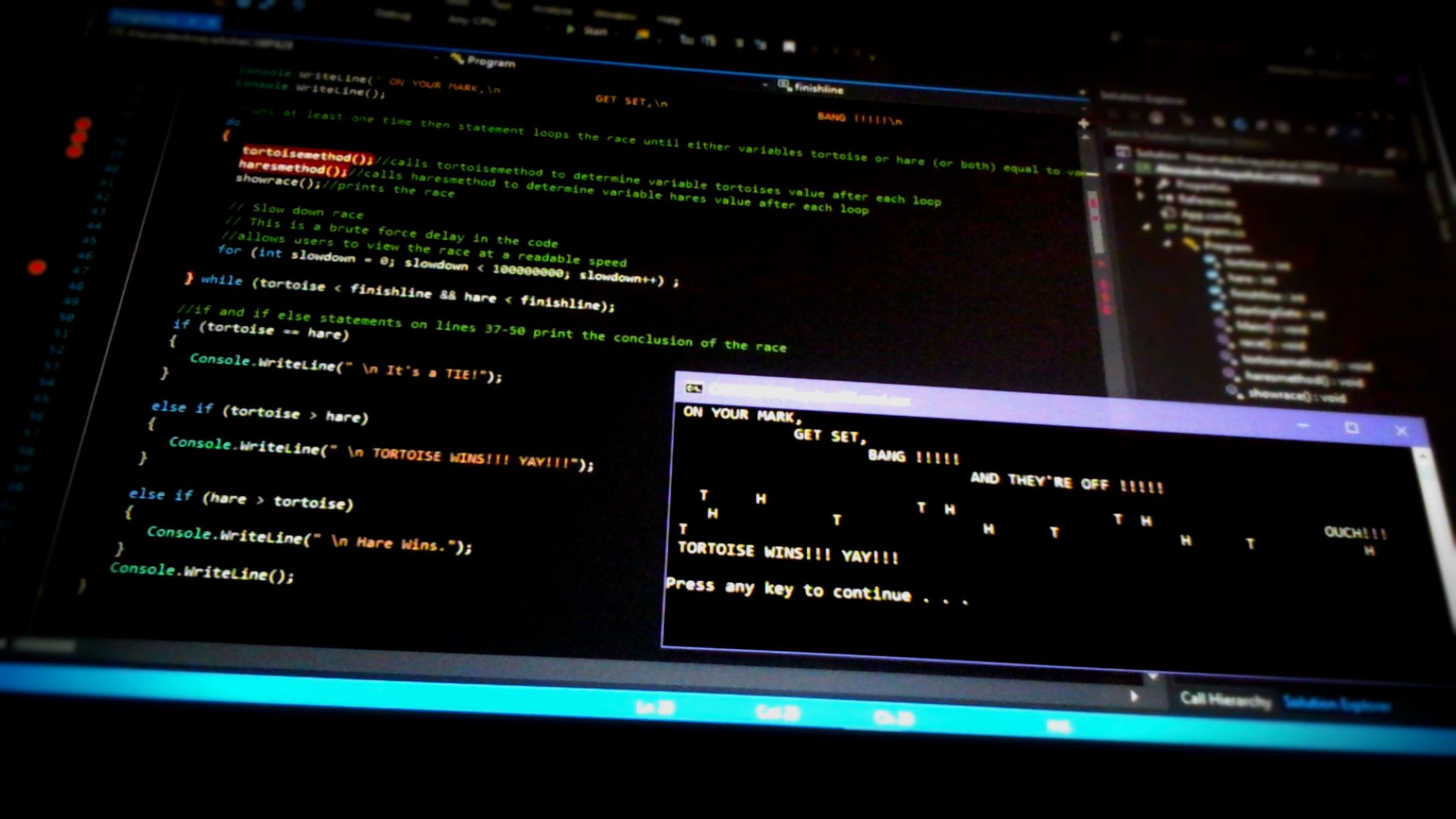Introduction
When it comes to game development, coding languages play a crucial role in bringing immersive and interactive experiences to life. From creating captivating graphics to implementing complex algorithms and game mechanics, the choice of coding language can have a significant impact on the development process and the final product itself.
In the world of game development, there is a wide range of coding languages to choose from. Each language has its own unique set of features and advantages, making it suitable for different types of games and development scenarios.
In this article, we will explore some of the most commonly used coding languages for game development and discuss their strengths and applications. By understanding the capabilities of these languages, you can make an informed decision about which one to use for your own game development projects.
Whether you’re a seasoned developer or just starting out, this guide will provide valuable insights into the world of game development coding languages. So, let’s dive in and discover the exciting possibilities that await!
Different Coding Languages for Games
In the realm of game development, various coding languages are utilized to create captivating and engaging experiences for players. Each coding language brings its own unique set of characteristics and strengths to the table, making it suitable for different types of games and development scenarios.
Let’s explore some of the commonly-used coding languages in game development:
1. C++: C++ is a popular choice for game development due to its high performance and low-level control. It provides direct access to hardware resources and allows developers to optimize code for maximum efficiency. Many game engines, including Unreal Engine and Unity, use C++ as their primary language for game development.
2. C#: C# is another widely-used language in game development, especially for creating games using the Unity game engine. It offers a blend of simplicity and power, making it an excellent choice for both beginners and experienced developers. C# provides features like garbage collection and a rich framework that simplifies game development tasks.
3. Java: While Java is not as commonly used in AAA game development, it has found its place in mobile game development and the Android platform. Java’s cross-platform capabilities and strong community support make it a suitable choice for developing mobile games that can run on multiple devices.
4. Python: Python is known for its readability and ease of use, making it a popular language for game development, especially for indie developers. It offers a wide range of libraries and frameworks that simplify game development tasks. Python is often used for creating 2D games, game prototypes, and scripting in game engines.
5. JavaScript: JavaScript is primarily used for web-based games and browser game development. With the rise of HTML5 and WebGL, JavaScript has gained popularity for developing interactive and visually appealing web games. It offers a vast ecosystem of libraries and frameworks like Phaser and Pixi.js that streamline game development.
6. UnrealScript: While not a standalone language, UnrealScript is worth mentioning due to its association with the Unreal Engine. UnrealScript is a scripting language specific to the Unreal Engine, providing flexibility and ease of use for implementing gameplay mechanics and modifying existing features.
These are just a few examples of the coding languages used in game development. Each language has its own strengths and weaknesses, and the choice depends on factors like the type of game, platform compatibility, performance requirements, and the developer’s familiarity with the language.
Now that we have explored the different coding languages used in game development, let’s move on to the next section and discuss how to choose the right language for your game development projects.
C++
C++ is a highly versatile and powerful programming language that is widely used in game development. It offers developers low-level control and high performance, making it an ideal choice for creating complex and resource-intensive games.
One of the major advantages of using C++ for game development is its direct access to hardware resources. This allows developers to optimize code for maximum efficiency, resulting in faster and more responsive games. C++ also provides a robust set of tools and libraries, such as DirectX and OpenGL, which are essential for creating cutting-edge graphics and visual effects.
Many popular game engines, including Unreal Engine and Unity, are built using C++ as their primary language. This makes C++ an excellent choice for developers looking to utilize these powerful engines and take advantage of their extensive features and tools.
While C++ can be more challenging to learn compared to other languages, its versatility and performance benefits make it worth the effort. With its object-oriented structure, C++ allows for modular code development, making it easier to manage larger and more complex game projects.
Furthermore, C++ has a large and active community of developers, offering support, resources, and libraries to assist in game development. The availability of abundant online resources and tutorials makes learning and mastering C++ for game development more accessible.
One drawback of using C++ is that it may require more development time compared to languages with higher-level abstractions. This is due to the need to manually manage memory and handle lower-level details. However, the performance gains achieved through optimized C++ code often outweigh the extra development time.
In summary, C++ is a powerful and widely-used language in game development, offering low-level control, high performance, and extensive support through popular game engines. Its direct access to hardware resources enables developers to create immersive and visually stunning games. For developers seeking performance and flexibility, learning C++ is a valuable investment in the world of game development.
C
C is a foundational programming language that has been widely used in various industries, including game development. Although it is not as commonly used as C++ or other languages in modern game development, it still has its merits and applications in certain scenarios.
One of the advantages of using C for game development is its efficiency and low-level control. C allows for direct access to hardware resources, making it suitable for developing low-level systems and optimizing performance-critical code. This can be particularly crucial for developing games that require maximum efficiency, such as console games or games targeting older hardware platforms.
Furthermore, C offers a smaller and more lightweight codebase compared to higher-level languages. This can be advantageous for developing games with specific memory constraints, especially on resource-limited platforms.
Although C is a lower-level language, it is still widely supported on various platforms and has a robust set of libraries and frameworks available. These libraries provide functionality for handling graphics, audio, and input systems, allowing developers to build games even without using higher-level game engines.
However, it is important to note that developing games in pure C can be more challenging and time-consuming than using higher-level languages or full-fledged game engines. This is because C requires developers to handle lower-level details, such as memory management, manually. Additionally, C lacks some of the modern features and abstractions present in languages like C++, which can make certain tasks more complex.
Despite these challenges, C can still be a viable choice for game developers with specific requirements or those looking to build their own engines or low-level systems. Additionally, understanding C can provide a solid foundation for learning other languages, including C++.
In summary, while C is not as commonly used in modern game development as other languages, it still has its place in certain scenarios. Its efficiency, low-level control, and smaller codebase make it suitable for developing games with specific performance or memory requirements. By harnessing the power of C, developers can create optimized and platform-specific games, albeit with more manual effort compared to higher-level languages.
Java
Java is a versatile and widely-used programming language that finds its application in various domains, including game development. While not as prevalent in AAA game development, Java has gained popularity in mobile game development and the Android platform.
One of the major advantages of using Java for game development is its cross-platform capabilities. Java games can be developed to run on different operating systems, including Windows, macOS, and Linux, without the need for significant modifications. Additionally, Java’s compatibility with the Android platform makes it an excellent choice for developing mobile games that can reach a wide audience.
Java also benefits from a strong community and a vast ecosystem of libraries and frameworks. Libraries like LibGDX and jMonkeyEngine provide game developers with tools and resources to streamline the development process. These libraries offer features such as graphics rendering, input management, and physics simulation, saving developers from reinventing the wheel and enabling faster development.
Furthermore, Java’s object-oriented nature makes it well-suited for larger game projects and team collaboration. Object-oriented programming allows for modular code development and easier maintenance, making it easier to manage complex game projects.
However, compared to languages like C++ and C#, Java may have some performance limitations. Java, being an interpreted language, can have increased memory requirements and slightly slower runtime compared to lower-level languages. While this may not be a significant concern for small or less resource-intensive games, it is something to consider for high-performance, graphics-intensive games.
Another consideration when using Java for game development is the learning curve. While Java itself is relatively easy to learn, game development with Java often involves the use of specific frameworks and tools, which may require additional learning. This could add some complexity to the development process, particularly for beginners.
In summary, Java is a versatile language for game development, with its cross-platform capabilities and strong community support. It offers compatibility with the Android platform, making it a suitable choice for mobile game development. While there may be some performance trade-offs compared to lower-level languages, Java offers a range of libraries and frameworks that simplify game development tasks. With its object-oriented structure, Java is well-suited for larger game projects and team collaborations.
Python
Python is a versatile and beginner-friendly programming language that has gained popularity in various domains, including game development. It offers a wide range of libraries and frameworks that make game development accessible and enjoyable for developers of all skill levels.
One of the major advantages of using Python for game development is its simplicity and readability. Python’s clean and concise syntax makes it easier to write and understand code, reducing development time and effort. This is particularly beneficial for indie game developers or individuals who are new to programming.
Python’s extensive library ecosystem is another significant advantage for game developers. Libraries such as Pygame, Panda3D, and Arcade provide extensive functionality for graphics rendering, audio processing, and user input, allowing developers to create 2D and even simple 3D games without much hassle.
Additionally, Python’s cross-platform capabilities make it a versatile choice for game development. Python games can be developed to run on different operating systems, including Windows, macOS, and Linux, with minimal modifications. This allows developers to target a wider audience and expand their game’s reach.
Python also seamlessly integrates with other languages, making it compatible with existing game engines or frameworks. For example, Python can be used alongside C++ in game engines like Blender, allowing developers to leverage the powerful features of C++ while enjoying the simplicity and ease of use of Python for scripting and game logic implementation.
However, it is important to note that Python may not be the best choice for performance-critical or graphics-intensive games. While Python is generally fast enough for many types of games, it may not offer the same level of performance as lower-level languages like C++ or even Java. If maximum performance is a requirement, Python may not be the most optimal choice.
Overall, Python provides a user-friendly and accessible platform for game development, particularly for 2D games, indie developers, and beginners. Its simplicity, vast library ecosystem, and cross-platform capabilities make it a valuable tool for creating engaging and enjoyable games without the steep learning curve often associated with other languages.
JavaScript
JavaScript is a widely-used programming language that was primarily designed for web development. However, with the advent of HTML5 and WebGL, JavaScript has evolved into a powerful language for game development, particularly for web-based games and browser game development.
One of the major advantages of using JavaScript for game development is its accessibility. As a language that runs directly in the browser, JavaScript allows developers to create games that can be played instantly without the need for any additional software or plugins. This makes JavaScript games easily accessible to a wide audience, as they can be played on various devices and platforms.
JavaScript also benefits from a vast and vibrant web development community. This community has created a wealth of resources, libraries, and frameworks specifically for game development. Popular JavaScript game development frameworks like Phaser, Pixi.js, and Three.js provide developers with powerful tools for creating interactive and visually appealing web games.
Furthermore, thanks to its asynchronous and event-driven nature, JavaScript is well-suited for creating interactive and real-time games. Its ability to handle input events and update game states in response to user actions makes it a compelling choice for building interactive gaming experiences.
The compatibility of JavaScript with HTML5 and WebGL also allows for the efficient utilization of hardware acceleration, enabling developers to create visually stunning games with smooth graphics and animations.
However, it is important to note that JavaScript is primarily intended for web-based games and may not be suitable for all types of games, especially those that require high levels of performance and complex game mechanics. Additionally, JavaScript can be limited in terms of direct system-level access.
Despite these limitations, JavaScript is an excellent choice for developing casual and web-based games, as well as browser game development. Its accessibility, extensive library support, and real-time capabilities make it an ideal language for creating engaging and interactive gaming experiences that can reach a vast audience across various devices and platforms.
UnrealScript
UnrealScript is a scripting language specifically designed for game development within the Unreal Engine. While UnrealScript has been largely replaced by Blueprints and C++ in newer versions of Unreal Engine, it still holds significance for developers working on legacy projects or using older engine versions.
UnrealScript offers a high-level and easy-to-read syntax, making it accessible for developers who are new to programming or prefer a scripting approach. It provides a simplified way to implement gameplay mechanics, AI behaviors, and interactive elements within the Unreal Engine.
One of the advantages of using UnrealScript is its tight integration with the Unreal Engine’s visual scripting system, known as Blueprints. Blueprints allow developers to create game logic and prototypes without writing any code. However, for more complex interactions or performance-critical tasks, UnrealScript can be used alongside Blueprints to extend functionality and optimize performance.
UnrealScript also benefits from the extensive functionality provided by the Unreal Engine, such as its advanced rendering systems, physics simulations, and networking capabilities. This allows developers to focus on implementing game-specific features and mechanics without having to worry about low-level details.
One consideration when using UnrealScript is its limited use and support in newer versions of the Unreal Engine. With Unreal Engine 4, the focus shifted towards Blueprints and C++ as the primary scripting and programming languages. As a result, the resources and community support for UnrealScript may be more limited compared to other languages.
However, it is worth noting that learning UnrealScript can still be beneficial for developers working on legacy projects or those looking to gain a deeper understanding of Unreal Engine’s core systems. Although UnrealScript is not essential for all Unreal Engine development, knowing it can be advantageous in certain scenarios.
In summary, while UnrealScript may not be as widely used in modern game development as Blueprints or C++, it still holds importance for developers working on legacy projects or utilizing older versions of the Unreal Engine. Its high-level syntax and integration with the Unreal Engine provide an accessible way to implement gameplay mechanics and extend functionality. Although newer developments in the Unreal Engine have shifted the focus, UnrealScript remains a valuable tool for certain game development scenarios within the Unreal Engine ecosystem.
Choosing the Right Language for Your Game Development
Choosing the right programming language for your game development project is a crucial decision that can impact the success and efficiency of your game. Each coding language has its own strengths, limitations, and target applications. To make an informed choice, consider the following factors:
Type of Game: The type of game you plan to develop is an essential consideration. Different genres or styles may require specific features or performance levels. For example, complex 3D games with advanced graphics may benefit from lower-level languages like C++ or C#, while simpler 2D games could be efficiently developed using Python or JavaScript.
Platform Compatibility: Consider the target platform or platforms for your game. Certain languages have better support or compatibility for specific platforms. For instance, if you’re targeting mobile devices or the Android platform, Java may be a suitable choice. Alternatively, if you’re targeting web-based games, JavaScript would be the natural choice.
Performance Requirements: Evaluate the performance requirements of your game. High-performance games, such as AAA titles or graphics-intensive projects, often benefit from languages like C++ or C#. These languages provide low-level control and direct access to hardware resources, optimizing performance and responsiveness.
Developer Experience: Consider your team’s expertise and familiarity with programming languages. Using a language that your team is already experienced in can lead to faster development and fewer learning curves. However, incorporating new languages into your team’s skill set can also be a valuable opportunity for growth and learning.
Community and Resources: Assess the availability of resources, libraries, and community support for the chosen language. Robust community support and extensive libraries can significantly expedite the development process and assist in problem-solving.
Integration with Game Engines: If you plan to use a game engine, it is essential to consider the supported coding languages and the engine’s capabilities. Game engines like Unity and Unreal Engine have their preferred languages (C# and C++ respectively), which can simplify development and offer additional functionality and tools.
By carefully evaluating these factors and understanding the strengths and limitations of different coding languages, you can make an informed decision about the best language for your game development project. Remember, there is no one-size-fits-all solution, and the optimal choice may vary depending on the specifics of your game and development requirements.
Conclusion
Choosing the right coding language for game development is a critical decision that can significantly impact the success and efficiency of your project. Each language brings unique strengths and advantages to the table, allowing developers to create immersive and engaging gaming experiences.
From the high-performance capabilities of C++ to the accessibility of Python, the versatility of Java, the web-based possibilities of JavaScript, and the scripting power of UnrealScript, each language offers distinct features that cater to different development needs and goals.
Consider factors such as the type of game you plan to develop, platform compatibility, performance requirements, team expertise, available resources, and integration with game engines. By carefully evaluating these factors, you can determine the most suitable language for your specific game development project.
Remember, there is no one-size-fits-all solution. The best programming language for your game development endeavors will depend on the unique requirements, goals, and constraints of your project.
Regardless of the language you choose, always strive to create engaging, immersive, and optimized gaming experiences for your players. Keep yourself updated on the latest trends and advancements in the world of game development, and never stop learning and growing in your coding skills.
With the right coding language and a passion for creating games, you can embark on an exciting and rewarding journey into the world of game development. So, go forth and bring your gaming ideas to life!

























